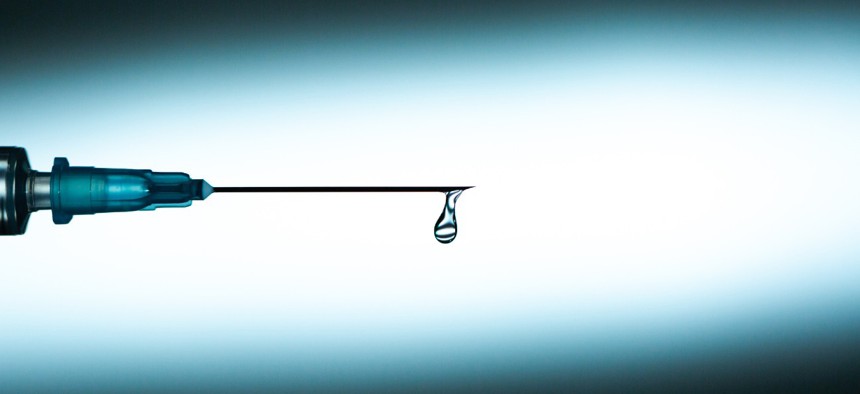
“All Americans should get educated about this disease, including how to prevent it, its symptoms, and how to get tested,” CDC Director Rochelle Walensky said on Friday. Anna Efetova/Getty Images
As More Monkeypox Cases Pop Up, the Federal Government is Bulking Up its Supply of Vaccines
Monkeypox cases are increasing, but no deaths have been reported.
On Friday, federal officials assuaged any worries that there won’t be enough vaccines for the monkeypox outbreak, but they are still bulking up its supply if more are needed.
As of June 9, there have been 45 cases of monkeypox detected across 15 states and the District of Columbia, and more than 1,300 cases across 31 countries worldwide. While cases have increased, there still haven’t been any reported deaths, according to federal public health officials.
“Over the past two weeks, [the Centers for Disease Control and Prevention] has continued to increase awareness of monkeypox through close work with our public health partners and clinicians as well as through outreach and communications across affected communities and the public,” CDC Director Rochelle Walensky said on a briefing call on Friday. “All Americans should get educated about this disease, including how to prevent it, its symptoms, and how to get tested.”
Vaccines are being offered to individuals who have had “high risk contact with infected individuals,” said Raj Panjabi, senior director for global health security and biodefense at the White House.
The Office of the Assistant Secretary for Preparedness and Response at the Health and Human Services Department is continuing to work with the CDC and White House on the monkeypox response as well as with state and local partners on their requests for vaccines and therapeutics, said Dawn O’Connell, assistant secretary for preparedness and response.
The Strategic National Stockpile has enough vaccines (both the Jynneos and ACAM 2000) to vaccinate millions of Americans if necessary. This includes more than 100 million doses of ACAM 200 (which could potentially have serious side effects) and about 72,000 doses of Jynneos in its immediate inventory and the government will soon receive an additional 300,000 doses from the manufacturer Bavarian Nordic over the next few weeks.
“The company is also holding over 1 million additional fully filled and finished doses owned by the U.S. government,” O’Connell continued. “Further, in order to ensure we have enough vaccines for a variety of scenarios, today we announced an order of 500,000 liquified frozen Jynneos doses to be filled and finished from existing bulk vaccines. The additional doses will be delivered to us later this year. The U.S. government owns an additional 15.9 million doses in bulk drug substance that can also be filled and finished at our request.”
As of now, the government has received requests for vaccines and treatments from 16 states and jurisdictions. So far, it has delivered more than 1,400 vaccine courses and over 110 treatment courses to affected states and localities.
As the government works to increase its Jynneos supply and develop a vaccine strategy, ACAM 200 “does have use for printing monkeypox for individuals who are not at risk for adverse events and I think it’s going to continue to be part of our conversation as we make those plans,” said Capt. Jennifer McQuiston, deputy director of the Division of High Consequence Pathogens and Pathology at the CDC, when asked about it.
Though they provided numbers on the vaccine supply during a briefing on May 23, officials declined to give numbers last week, citing security reasons. However, O'Connell shared numbers in a blog post on Monday and officials went over them during the call on Friday.
When asked to explain the change O’Connell said, “We don’t traditionally share what we have in the strategic national stockpile for national security reasons. We don’t need our adversaries to understand what exactly we have available to us to protect the country.” However, after the conversation last week, officials “thought it would help in this case to just give a little more granularity that the number of vaccines is not something the American public needs to worry about,” although they have continually said they have enough vaccines.
“Frankly, if our adversaries heard that, I think that would be a deterrent for them to know too,” she added. Additionally, “we did want to be as open and transparent in this particular situation because we thought it made sense to do so.”
As for testing, to date, more than 300 PCR (polymerase chain reaction) tests have been conducted and week-on-week testing has increased by more than 45%, according to Panjabi. Officials are working to make testing more convenient and “expand testing beyond public health labs through commercial partners,” he said. Labs across the country can currently conduct over 1,000 tests a day.
Panjabi encouraged those who may be experiencing symptoms of monkeypox, such as flu-like symptoms followed by a rash, to speak with their healthcare providers and get tested.
The United States has plenty of tests, but “we are also proactively working with [Food and Drug Administration] and [Centers for Medicare & Medicaid Services] for how we may further this capacity,” the CDC’s Walensky said.
In addition to the briefing, the CDC outlined in a press release on Thursday how monkeypox can and cannot be transmitted, which is different from the viruses that cause COVID-19 or measles.
Monkeypox “is not known to linger in the air and is not transmitted during short periods of shared airspace,” but rather “through direct contact with body fluids or sores on the body of someone who has monkeypox, or with direct contact with materials that have touched body fluids or sores, such as clothing or linens,” the report stated. “It may also spread through respiratory secretions when people have close, face-to-face contact.”
As CNN reported on Friday, a servicemember in Germany has the first-known case of monkeypox in the U.S. military







